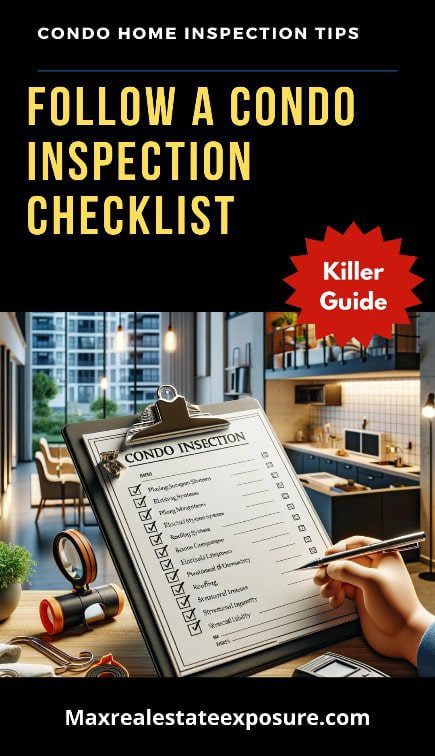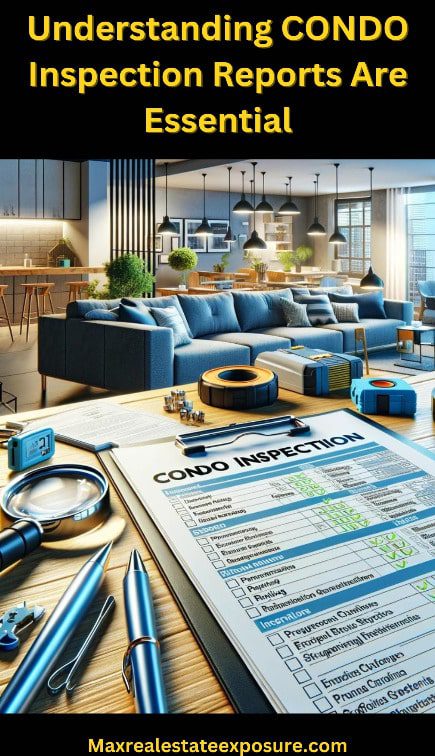 Understanding the cost of a condo inspection is crucial for buyers. Condo inspections ensure the unit’s condition and identify potential issues.
Understanding the cost of a condo inspection is crucial for buyers. Condo inspections ensure the unit’s condition and identify potential issues.
I will guide you based on years of experience as a real estate agent and participating in numerous inspections.
This is what you will learn:
- The average cost range for condo inspections
- Factors influencing the inspection price
- What inspectors check during a condo inspection
- Understanding inspection reports
As a condo owner in several states and a Realtor for the past thirty-eight years, I have learned that condo inspections are almost as crucial as inspections of single-family homes. Whether buying or selling, getting a condo inspection can be valuable. When selling, you can have a pre-sale inspection to ensure no surprises. As a buyer, you can feel confident you’re making a sound investment. I always recommend my clients have an inspection. It is money well spent.
Even when buying as-is, you should consider an inspection.
Let’s examine the details worth knowing.
What is a Condo Inspection?
Average Cost Range for Condo Inspections
Condo inspection costs vary based on several factors. On average, buyers can expect to pay between $300 and $500. This range depends on the unit size, location, and the inspector’s experience.
Large cities and high-cost areas may see prices exceeding $500, while smaller towns may fall below $300. Where I live in Massachusetts, this home-buying expense averages $400s.
Higher Costs in Urban Areas
In metropolitan areas, the higher cost of living and increased demand for services often drive up inspection prices. Due to higher operational costs, inspectors in these areas may charge a premium for their services.
Lower Costs in Rural Areas
In contrast, inspections in suburban, rural, or less densely populated areas are more affordable. The lower cost of living and decreased service demand allows inspectors to charge less.
Factors Influencing Condo Inspection Prices
Several factors affect the cost of a condo inspection:
- Location: Inspections in urban areas generally cost more than in rural areas.
- Unit Size: Larger condos take more time to inspect, increasing costs.
- Inspection Type: Specialized inspections (e.g., mold, radon) add to the base cost. Expect your home inspector to charge separately for these additional check-ups.
- Inspector’s Experience: Experienced inspectors may charge higher fees but provide more thorough assessments.
Location
The condo’s geographic location plays a significant role in determining inspection costs. Inspectors may charge more in high-demand areas due to the competitive market and higher operational expenses.
Unit Size
The size of the condo directly impacts the inspection duration and complexity. Larger units require more time to inspect, resulting in higher fees. A one-bedroom condo may cost less to inspect than a three-bedroom unit.
The cost of a home inspection is similar to that of a house but is usually slightly less based on size. In other words, most homes are more substantial than condos.
Inspection Type
The type of inspection also influences the cost. Basic inspections cover general areas like structure, plumbing, and electrical systems. However, specialized inspections, such as mold or radon testing, incur additional charges.
These inspections require specialized equipment and expertise, increasing the overall cost.
Inspector’s Experience
An inspector’s experience and reputation can affect pricing. Highly experienced inspectors with a track record of thorough and accurate inspections may charge a premium for their services.
While this may increase the cost, it often results in a more detailed and reliable assessment.
Condo Inspection Checklist

Inspectors follow a detailed inspection checklist to ensure a comprehensive evaluation. Here’s what they typically inspect:
- Structure: Inspectors check walls, ceilings, and floors for signs of damage or structural issues.
- Electrical Systems: They ensure all wiring, outlets, and fixtures meet safety standards.
- Plumbing: Inspectors look for leaks, proper drainage, and the condition of pipes.
- HVAC Systems: They check the efficiency and functionality of heating, ventilation, and air conditioning units.
- Appliances: Inspectors test built-in appliances like stoves, dishwashers, and refrigerators.
- Windows and Doors: They check for proper installation, operation, and signs of wear.
- Balconies and Patios: Inspectors examine these areas for safety and structural integrity.
- Common Areas: They assess shared spaces for overall maintenance, such as hallways and lobbies.
Structure
Inspectors thoroughly examine the condo’s structure, including walls, ceilings, and floors. They look for cracks, signs of water damage, and any structural issues that could compromise the unit’s integrity. This includes checking for sagging floors, uneven walls, and signs of foundational problems.
Electrical Systems
The electrical system inspection ensures all wiring, outlets, and fixtures are up to code and functioning correctly. Inspectors test outlets for proper grounding, check circuit breakers, and look for potential fire hazards. They also inspect lighting fixtures and switches to ensure they operate safely.
Plumbing
Inspectors assess the plumbing system for leaks, corrosion, and proper drainage. They check faucets, showers, and toilets for leaks or water pressure issues.
Additionally, they inspect visible pipes for signs of rust or damage that could indicate future problems.
HVAC Systems
Heating, ventilation, and air conditioning (HVAC) systems are critical for a comfortable living environment. Inspectors evaluate the condition of HVAC units, check for proper airflow, and test thermostats for accuracy. They also inspect ductwork for cleanliness and signs of wear.
Appliances
Built-in appliances, such as stoves, dishwashers, and refrigerators, are tested for functionality. Inspectors ensure these appliances operate correctly and check for any signs of damage or wear that could affect their performance.
Windows and Doors
Inspectors check windows and doors for proper installation, operation, and signs of wear. They ensure windows open and close smoothly, lock securely, and provide adequate insulation. Door inspections include checking for alignment, secure locks, and ease of operation.
Balconies and Patios
Balconies and patios are inspected for safety and structural integrity. Inspectors look for signs of deterioration, such as cracks, rust, or loose railings. They also ensure these areas meet safety standards and are adequately maintained.
Common Areas
Shared spaces, like hallways and lobbies, are assessed for overall maintenance and safety. Inspectors evaluate the condition of these areas, looking for cleanliness, proper lighting, and any signs of neglect. They also check for compliance with safety regulations, such as fire exits and emergency lighting.
Differences Between Condo Inspections and Other Property Inspections
Condo inspections differ from other property inspections in several ways:
- Common Areas: Inspectors evaluate shared spaces in condos, unlike single-family homes.
- Building Systems: They check systems managed by the condo association, like elevators and boilers.
- Limited Exterior Inspection: Unlike home inspections, condo inspections focus slightly less on exterior elements.
- Association Documents: Inspectors may review condo association documents for maintenance records.
Common Areas
Shared spaces such as hallways, lobbies, and recreational areas are included in condo inspections. Inspectors assess these areas for overall maintenance, cleanliness, and compliance with safety standards. This differs from single-family home inspections, where common areas are not a factor.
Building Systems
Condo inspections include evaluating building-wide systems managed by the condo association. These systems may consist of elevators, boilers, and centralized HVAC units.
Inspectors ensure these systems are well-maintained and comply with safety standards, comprehensively assessing the building’s overall condition.
Limited Exterior Inspection
Sometimes, condo inspections focus less on exterior elements than single-family home inspections. While inspectors may check balconies and patios, they do not typically assess exterior walls, roofs, or landscaping.
These areas are usually the condo association’s responsibility, reducing the inspection scope.
Association Documents
Inspectors might review condo association documents to understand rules, HOA fees, and maintenance records. This review helps identify potential issues related to financial stability, maintenance practices, and any upcoming special assessments. It gives buyers a clearer picture of the condo community’s management and future obligations.
Preparing for a Condo Inspection
Preparation ensures a smooth inspection process. Remember that even in as-is condo sales, inspections are essential.
Here are the steps to prepare:
- Review Condo Documents: Gather and review the condo association’s documents.
- Check Accessibility: Ensure all areas of the condo are accessible for inspection.
- Make a List: Note any concerns or questions for the inspector.
- Be Present: Attend the inspection to ask questions and understand findings firsthand.
Review Condo Documents
Before the inspection, review the condo association’s documents, including bylaws, rules, and recent meeting minutes. These documents provide insight into the community’s operations, financial health, and any upcoming projects that may affect your unit.
Check Accessibility
Ensure all areas of the condo are accessible for the inspector. This includes removing obstacles that might block access to electrical panels, plumbing, and HVAC units. Clear pathways allow the inspector to conduct a thorough evaluation without hindrance.
Make a List
Prepare a list of concerns or questions you have about the condo. This list can include specific issues you’ve noticed or areas you’re unsure about. Sharing this list with the inspector ensures your concerns are addressed during the inspection.
Attend The Inspection
Attend the inspection to observe the process and ask questions. Being present allows you to understand the inspector’s findings better and receive immediate answers to your questions.
It also helps you see firsthand any issues that may need attention. Negotiating inspections is more challenging if you don’t truly understand the problems.
Understanding Inspection Reports
 Inspection reports detail the inspector’s findings. Key elements include:
Inspection reports detail the inspector’s findings. Key elements include:
- Summary of Results: A concise overview of significant issues.
- Detailed Observations: In-depth notes on each inspected area.
- Photographs: Visual evidence of problems and areas of concern.
- Recommendations: Suggestions for repairs or further evaluations.
Summary of Findings
The report begins with a summary of significant issues discovered during the inspection. This section highlights critical areas needing attention, providing a quick reference for buyers to understand the unit’s overall condition.
The best inspectors redline all the vital areas of concern for condo buyers.
Detailed Observations
Following the summary, the report includes detailed observations of each inspected area. Inspectors document the condition of structures, systems, and appliances, noting any defects or concerns. This section provides a comprehensive view of the unit’s condition.
Photographs
Photographs accompany the detailed observations, offering visual evidence of issues. These images help buyers understand the extent of problems and provide an apparent reference for repairs or further evaluations.
I have found that the best reports contain easy-to-understand photography of the issues. The problems are described so a layperson can understand them.
Recommendations
Inspectors recommend repairs or additional inspections. These suggestions help buyers prioritize necessary actions and make informed decisions about the property’s condition and required maintenance.
Additional Resources
For further information, consider these resources:
- Home Inspector Associations: Organizations like ASHI or InterNACHI offer directories and inspection standards.
- Real Estate Agents: Your agent can recommend trusted inspectors and provide insights on local costs.
- Online Reviews: Read reviews of inspectors to ensure quality and reliability.
- Government Websites: Check local regulations and guidelines for condo inspections.
Home Inspector Associations
Organizations such as the American Society of Home Inspectors (ASHI) or the International Association of Certified Home Inspectors (InterNACHI) provide directories of certified inspectors. These associations also set industry standards, ensuring inspectors meet professional requirements and follow ethical practices.
I have found that most of the inspectors with these certifications are top-notch.
Real Estate Agents
Real estate agents can be valuable resources for finding reputable inspectors. They often have relationships with trusted inspectors and can provide recommendations based on their experience.
I always give my clients a few inspectors I trust for their thoroughness and attention to detail.
Agents can also offer insights into local inspection costs and practices.
Online Reviews
Reading online reviews helps gauge the quality and reliability of inspectors. Websites like Yelp, Google, and Angie’s List feature customer reviews and ratings, allowing you to make informed decisions when selecting an inspector.
Government Websites
Local government websites often provide information on condo inspection regulations and guidelines. These resources ensure you understand your area’s legal requirements and standards for condo inspections.
Conclusion
Understanding condo inspection costs and processes helps buyers make informed decisions. Remember the key takeaways:
- Condo inspections cost between $300 and $500.
- Factors like location, unit size, and inspection type influence the price.
- Inspectors check structures, systems, and common areas in detail.
For your next step, learn about common issues found in condo inspections to better prepare for potential findings. Happy condo hunting!
About the Author: Bill Gassett, a nationally recognized leader in his field, provided the above real estate information on the cost of a condo home inspection. Bill has expertise in mortgages, financing, moving, home improvement, and general real estate.
Learn more about Bill Gassett and the publications in which he has been featured. Bill can be reached via email at billgassett@remaxexec.com or by phone at 508-625-0191. For the past 38+ years, Bill has helped people move in and out of Metrowest towns.
Are you thinking of selling your home? I am passionate about real estate and love sharing my marketing expertise!
I service Real Estate Sales in the following Metrowest MA towns: Ashland, Bellingham, Douglas, Framingham, Franklin, Grafton, Holliston, Hopkinton, Hopedale, Medway, Mendon, Milford, Millbury, Millville, Natick, Northborough, Northbridge, Shrewsbury, Southborough, Sutton, Wayland, Westborough, Whitinsville, Worcester, Upton, and Uxbridge Massachusetts.

